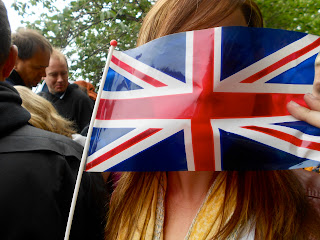On Monday in class we worked on one of our major assignments,
the summaries of Le Morte D’Arthur. I worked on these and my journals for the
majority of the day. This evening we had a class trip to see Taming of the Shrew at the Globe
Theatre. On Tuesday in class we talked a bit about the differences between the 1967
film we saw in class and the play we saw at the Globe Theatre. Today is also
our last class.
I really enjoyed having the experience to see Taming of the Shrew at the Globe Theatre
in London last night. It actually really exceeded my expectations in so many
ways. When we watched the film in class, I could not follow along at all. I
felt it was boring and dry, and I have a hard time getting into older films
like such –especially Shakespeare films. I was expecting the same exact film,
except on stage, when I entered the Globe Theatre. However, when a drunk man
dressed in England paraphernalia came stumbling on stage, and the cast members
dressed him up as a lord while he was passed out in order to trick him into
thinking he was a lord, I knew it would be a bit different than the film.
Like I mentioned, one of the main differences I saw between
the 1967 film and the Globe Theatre play was the way the genre was presented. I
don’t remember laughing once while watching the film in class. It was more
to-the-point and less of a comedy, in my eyes. The play at the Globe Theatre
was absolutely hilarious – Petruchio even shows up to his own wedding wearing a
metal bowl on his head with a carrot inside for his “horse”, mismatched socks
and boots, a vest with nothing under it, and pants that he ended up tearing off
to reveal a man thong.
Of course, besides the introduction with the drunk English
lord, the entire concept and story line was the same in both the film and the
play. Once again, this Shakespeare play presented the double lives theme very
well. I loved the entire performance, but I personally did not agree with Kate’s
speech at the end. I thought she was too submissive to her husband and even
appeared to be a weaker woman. Of course, I do think Shakespeare’s intent was
to make the shrew as submissive s possible to make the point clear.



















































